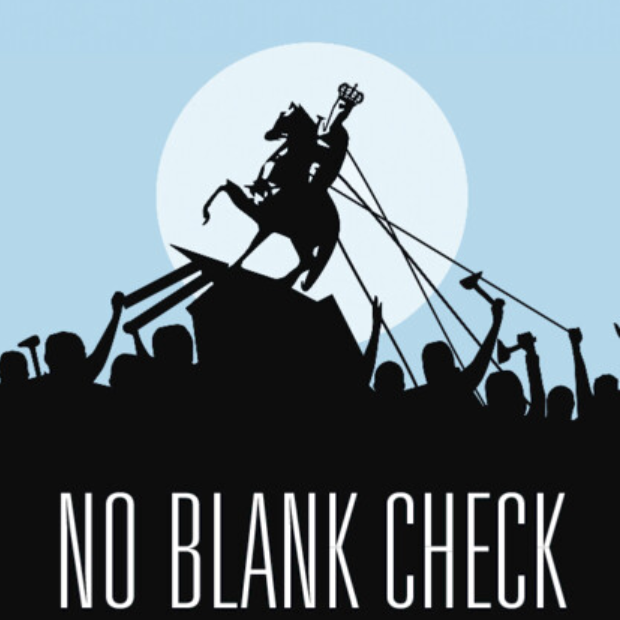In a new book, political scientist Andrew Reeves explores the origins and consequences of public antipathy toward the unilateral use of presidential power.

Political scientist Andrew Reeves’ new book No Blank Check: The Origins and Consequences of Public Antipathy towards Presidential Power (Cambridge University Press) highlights Americans’ deep skepticism toward the authority of the executive office. Though this distrust feels particularly apt in today’s highly partisan political climate, Reeves, the director of the Weidenbaum Center on the Economy, Government, and Public Policy and a professor in the Department of Political Science, notes that antipathy toward unilateral power cuts across both party lines and time — from the country’s founding to today.
Reeves and his co-author Jon C. Rogowski first started digging into presidents’ use of executive power in 2013 when then-President Barack Obama confronted the escalating civil war in Syria. As reports emerged of the use of chemical weapons against Syrian civilians, the U.S. faced pressure to respond. However, Obama ultimately left it up to Congress to authorize him to send in troops, displaying what Reeves and Rogowski viewed as a surprising reluctance to act.
“As scholars of the presidency, we often think of the office as being held by single-minded seekers of power,” Reeves said. “But Obama demurred when it came to taking action. The idea that a president would not do something on his own, even when he was being told by copartisans in Congress that he didn’t need Congressional authorization, that was really surprising to us.”
Reeves and Rogowski set out to understand why the leader of the free world would refuse to take advantage of authority accumulated over years. They found that despite American democracy’s system of checks and balances, congresses and courts move slowly and tend to fall in line, leaving public opinion as among the most powerful constraints on presidential power.
“The conventional wisdom is that individuals who support a president are going to support whatever that president wants to do and not care about how they get it done, in part because most Americans have low levels of political knowledge and aren’t all that well versed in the procedural aspects of democracy,” Reeves said. “But we found that the public is actually more nuanced around how they feel about presidents going it alone. Our argument in the book is that we need to more fully incorporate how important public opinion is in understanding how presidents can exercise power.”
Based on results from The American Panel Survey (TAPS), a long-term study conducted by the Weidenbaum Center, Reeves and Rogowski found that respondents had relatively stable attitudes toward executive power, expressing low levels of support for presidents acting unilaterally and much deeper commitments to fairness and the rule of law. Even when the president changed, these views shifted only slightly over time.
In survey experiments conducted on TAPS, Reeves and Rogowski found that Americans overwhelmingly prefer legislation to executive action and even consider no action more acceptable than the use of unilateral power. “In our analyses, we found that in many cases voters prefer no outcome. They prefer no change in policy to a policy that was achieved through unilateral action,” Reeves said.

According to Reeves, this aversion to executive authority is baked into the founding of the United States and continues to be socialized into American culture to this day. The cover art for No Blank Check is based on depictions of American colonists pulling down a statue of King George III, a vivid indictment of kingly power. However, as the book notes, the sentiment isn’t unique to America. Other countries the team surveyed — over 60 countries from the Americas and Africa — shared American antipathy toward unilateral executive power.
“America scores high on support for democracy and rule of law and low on support for executive power, but we’re not outliers in that,” Reeves said. “At a basic human level, people just don’t like the arbitrary use of power.”
By looking at public opinion to understand the nature of presidential accountability, Reeves and Rogowski push back on the flippant dismissal of American voters as partisan automatons, simply doing what political parties tell them to do.
“The book sits in a world where American democracy and democracies around the world are perhaps seen as more fragile than they were a decade ago, and almost every discussion of the decline of democracy has something to do with executive power,” Reeves said. “It’s usually an executive who is so emboldened by the powers of the office that they’re threatening democracy in various ways.”
“There’s a lot to be pessimistic about in American democracy right now,” Reeves admitted. “But people do have a sense of how power should be exercised, and they bring that to bear when they look at policies and evaluate presidents. Ultimately, I am optimistic that the American people, the electorate, will be a force that will sustain democracy, not deplete it.”




